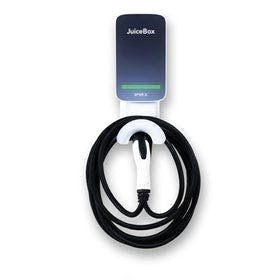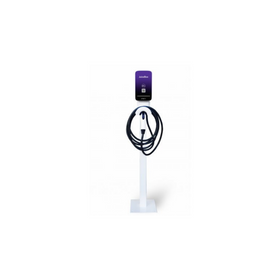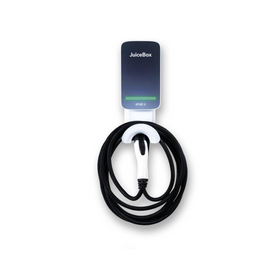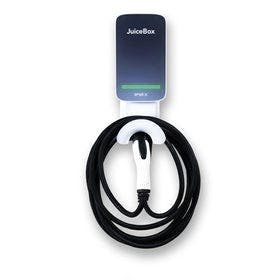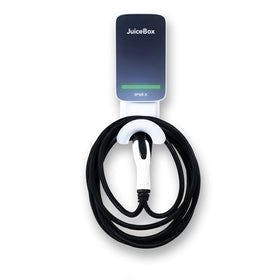
The Best Home Ev Chargers for 2022 (With Prices)
Last Updated: Feb 11, 2025The government of France recently announced that it would completely ban the sale of gasoline or diesel-powered cars by the year 2040. The United States is still a little behind its European counterparts on politically investing in the renewable energy economy. Nevertheless, few people would doubt that electric vehicles are the wave of the future of transportation.
Even if you don’t own an electric vehicle at the moment, the chances that your next car is electric will only increase as the years pass. Gas-powered vehicles only require you to pull into the nearest gas station to get the fuel needed to run your car. Although, electric vehicles require a little bit more forethought. Finding a quality home EV charger is essential for the electric vehicle owner. Below, we offer a detailed description of the different types of EV chargers available and suggest the top three EV chargers currently on the market.
Table of Contents
- What Is an Electric Vehicle Charger?
- How Many Types of EV Chargers Are There?
- What Are Level 1 EV Chargers?
- What Are Level 2 EV Chargers?
- What Are Level 3 EV Chargers?
- What Is the Fastest Type Of EV Charger?
- Can You Charge an Electric Vehicle With a Standard Plug?
- Do All-Electric Vehicles Use the Same Charger?
- Do I Require A Permit To Install a Home EV Charger?
- How Much Does It Cost To Install an EV Charger at Home?
- The Best EV Chargers on the Market Today
What Is an Electric Vehicle Charger?
An electric vehicle charger, commonly known as an 'EV charger' or 'Electric Vehicle Service Equipment (EVSE),' supplies power to charge an electric vehicle. Some vehicles come equipped with onboard converters that plug into a standard outlet, while others require EV charging stations. These charging stations incorporate power connectors that meet a variety of standards required by electric vehicles.

How Many Types of EV Chargers Are There?
Electric vehicle chargers are available in level 1, level 2, and level 3, or DC Fast Charger. As the level increases, the kilowatt (kW) power output results in shorter charging times. Level 1, level 2, and level 3 are also referred to as slow, fast, and rapid, or Type 1, Type 2, and Type 3, respectively.
What Are Level 1 EV Chargers?
Level 1 EV chargers are standard charging cords that plug into any regular outlet taking up to 20 to 40 hours to charge an electric vehicle fully. This is the most convenient way of charging an electric car, but the single-phase charging also takes significantly longer than level 2 and level 3 chargers.

What Are Level 2 EV Chargers?
Level 2 EV chargers are 240V medium-speed EV chargers and require an electrician to install them. Level 2 EV chargers take 6 to 8 hours to charge an electric vehicle fully. Level 2 EV chargers range in price between $660 to $930 after installation.
What Are Level 3 EV Chargers?
Level 3 or DC fast-charging stations are large EV chargers capable of charging an electric car to 80% within 20 to 30 minutes. While most level 3 chargers are made for commercial use, level 3 charging options are becoming available for the home. Level 3 EV chargers range in price between $1320 to $2650.
What Is the Fastest Type Of EV Charger?
Level 3 or DC fast charging EV chargers are the fastest EV chargers available today. These are large, fast chargers that require three-phase power providing up to 350kW. Level 3 chargers will intelligently scale down to match the most rapid charge rate that an electric vehicle will accept.

Can You Charge an Electric Vehicle With a Standard Plug?
Most electric vehicles are equipped with a charging unit compatible with standard outlets, making it easy to charge your car with a standard outlet. The downside of charging your vehicle with a standard outlet is that it takes 6-8 hours to charge a plug-in hybrid electric (PHEV) up to 20-40 hours for a battery-electric vehicle (BEV).
Do All-Electric Vehicles Use the Same Charger?
Electric vehicles available to the North American market are usually equipped with a J1772 EV connector. This connector is compatible with all-electric vehicles except for Tesla. While Tesla uses a proprietary connector, it can be made compatible using an adapter.
Do I Require A Permit To Install a Home EV Charger?
Level 1 EV chargers do not require a permit as they connect to a standard outlet. Level 2 chargers may require a permit if your home’s output voltage needs to be upgraded to 240v. Level 3 chargers will often require an update to your home's output voltage. With level 2 and level 3 charges, it is best to consult an electrician and check with local building codes.
How Much Does It Cost To Install an EV Charger at Home?
Electric vehicle owners should consider installing a level 2 charger, which runs on a 240-volt connection. Factoring in the cost of the level 2 charger, electrician labor, and other hidden costs, you can most likely install a system for around $1,200. It might represent a significant upfront investment. This type of charger can usually fully charge your car´s batteries in a few hours. Level 3 chargers require an electricity strength that is almost always not applicable to residential homes.
The initial investment for a level 2 EVSE often pays for itself in 1-2 years due to the savings associated with not requiring gasoline. General Motors, the company that makes the EV Chevrolet Volt, estimates that it takes just over 2,500 kWh to run the Volt for a year. It amounts to around $317 at the average electricity rate of $0.127 per kWh. You´d be hard-pressed to find any gas-powered vehicle that would cost you less than $1,000 per year for gasoline, especially with rising global oil prices.
The Best EV Chargers on the Market Today

Charge Point Wi-Fi Enabled Level 2 EV Charger
The Charge Point Wi-Fi Enabled Level 2 EV Charger is a level 2 charger for around $650 at Home Depot. However, if you want a faster charge for your car due to the frequent use of your EV, this charger might be the best option for you. It reportedly charges EV batteries six times faster than a standard 120-volt home system. The mobile app will also allow you to know how much charge your car battery has, no matter where you are. This can come in handy when you´re trying to gauge whether to put in an extra hour at work or head home. The 18-foot cord provides plenty of lengths, though you can upgrade to a 25-foot cord for another $100 or so.

Juice Box Pro 40 Level 2 EV Charger
The Juice Box Pro 40 is a level 2 charger that comes equipped with web-based charging control so that you can control the charging features of your car from the comfort of your home or office without having to venture out to the garage or parking lot in the middle of winter. With this charger, you can also control when your car is plugged in to avoid peak electric demand or rates. This feature can save you hundreds of dollars over a year of charging your vehicle. At just under $600 on Amazon, this option is also an affordable option for most families.

Siemens Residential Smart VersiCharge EV Charger Level 2
The Siemens VersiCharge VC30GRYU is an easy-to-use plug-and-play installation with a provided mounting bracket, providing you have a NEMA 6-50 receptacle. With charging times four times faster than level 1 EV chargers, the VersiCharge VC30GRYU is a 30 Amps, 240V level 2 charger. The VC30GRYU has a charge delay feature of 2, 4, 6, or 8 hours and can charge most EVs within 3.5 hours via a 20-foot flexible cord. This EV charging option is built to last and operates in temperatures of -30°C to +50° C. The Siemens VersiCharge VC30GRYU is available for $549, with opportunities to bundle compatible circuit breakers and receptacles.

Leviton EVR30-002-B1C EVR-Green E30 Charging Station
The Leviton EVR30-002-B1C Evr-Green E30 Charging Station is a 30 Amps, 208-240V, 7.2kW output EV charger. It comes equipped with an 18 foot charging cable and features charging restart following minor faults to ensure your vehicle battery is not undercharged. Additional safety features include ground monitor interruption, over current, over-voltage, under-voltage, and short circuit protection. The Leviton EVR30-002-B1C Evr-Green E30 is available for roughly $850.

EVOCHARGE EVSE, Level 2 Electric Vehicle Charging Station
The EVOCHARGE EVSE, Level 2 Electric Vehicle Charging Station is a 32 Amps, 240V UL Listed EV Charger boasting charging times of 8x faster than a standard Level 1 EV Charger. It's indoor and outdoor rated and is compatible with a NEMA 6-50 plug. This charger is fully compatible with all-electric and plug-in hybrid electric vehicles. It's important to note that Tesla electric vehicles require an adapter, which is standard amongst EV charging stations. This station comes with an 18-foot charging cable, NEMA 6-50 plug, and a universal mounting bracket.

Duosida Ready Charge
This level 2 EV charger is the least expensive on the market today. This charger works well with the Chevrolet Volt, Ford Energi, Toyota Prius, and other standard EV vehicles. While the charger cord is slightly shorter than other models, it is plenty long if you install a special outlet anywhere in your garage or driveway where you typically leave your car. Customer reviews report that this EV charger will easily cut in half the charge time from your level 1 EV charger, and the price makes it an excellent first investment for people wanting to try the step up to level 2 EV chargers.
Tobias Roberts
Tobias runs an agroecology farm and a natural building collective in the mountains of El Salvador. He specializes in earthen construction methods and uses permaculture design methods to integrate structures into the sustainability of the landscape.



